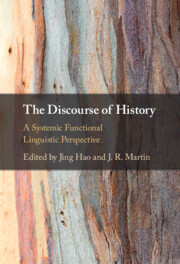Book contents
- The Discourse of History
- The Discourse of History
- Copyright page
- Contents
- Figures
- Tables
- Contributors
- Preface
- 1 Building Historical Knowledge through Language: A Systemic Functional Linguistic Perspective
- 2 Cultivating a Critical Gaze: Managing Technicality in Ancient History Teaching
- 3 Cultivating the Value of Democracy in History Teaching
- 4 Interpreting History: Valuing Events in a Postcolonial World
- 5 Coordinating Meaning: Scaffolding Teaching/Learning in Pedagogic Discourse
- 6 Explaining What Happened: Logical Metaphors in Spanish History Textbooks
- 7 Negotiating Values through Historical Evidence
- 8 Historical Empathy: Learning to Care about Others’ Suffering through Film
- 9 History in the Arts: Exploring the Past to Cultivate Students’ Gaze
- 10 Describing and Taxonomising the Phenomena of a Glorious Past
- 11 Representing Minority History in a Multi-Ethnic Country
- 12 Expressing Attitudes in Ancient Chinese History
- References
- Index
3 - Cultivating the Value of Democracy in History Teaching
Published online by Cambridge University Press: 16 May 2024
- The Discourse of History
- The Discourse of History
- Copyright page
- Contents
- Figures
- Tables
- Contributors
- Preface
- 1 Building Historical Knowledge through Language: A Systemic Functional Linguistic Perspective
- 2 Cultivating a Critical Gaze: Managing Technicality in Ancient History Teaching
- 3 Cultivating the Value of Democracy in History Teaching
- 4 Interpreting History: Valuing Events in a Postcolonial World
- 5 Coordinating Meaning: Scaffolding Teaching/Learning in Pedagogic Discourse
- 6 Explaining What Happened: Logical Metaphors in Spanish History Textbooks
- 7 Negotiating Values through Historical Evidence
- 8 Historical Empathy: Learning to Care about Others’ Suffering through Film
- 9 History in the Arts: Exploring the Past to Cultivate Students’ Gaze
- 10 Describing and Taxonomising the Phenomena of a Glorious Past
- 11 Representing Minority History in a Multi-Ethnic Country
- 12 Expressing Attitudes in Ancient Chinese History
- References
- Index
Summary
This chapter reports on a study that examines the cultivation of values in teaching ancient history in an Australian junior secondary school classroom. We focus on how the values of ‘democracy’ are discussed in learning about ‘city-states and governments in Ancient Greece’. Our analysis makes visible the language resources used to establish ‘democratic’ values and how these values are transmitted in the discourse of teaching and learning. We first identify three sources of evaluation – including the school’s history perspective, the teacher’s perspective, and the perspective of Australian citizens. We show that as the source of evaluation changes, different types of ‘democratic’ value are enacted. Democracy is formulated as a set of values enacted by clusters of evaluations, in opposition to what is evaluated as ‘non-democracy’. We also consider how the teacher confirms or rejects instances of evaluation as they work to form ‘bonds’, aligning students into a community of shared values. The chapter makes explicit the fact that in building knowledge of history, ‘what you know’ and ‘how you feel’ construct ‘who you are’.
- Type
- Chapter
- Information
- The Discourse of HistoryA Systemic Functional Linguistic Perspective, pp. 45 - 72Publisher: Cambridge University PressPrint publication year: 2024



